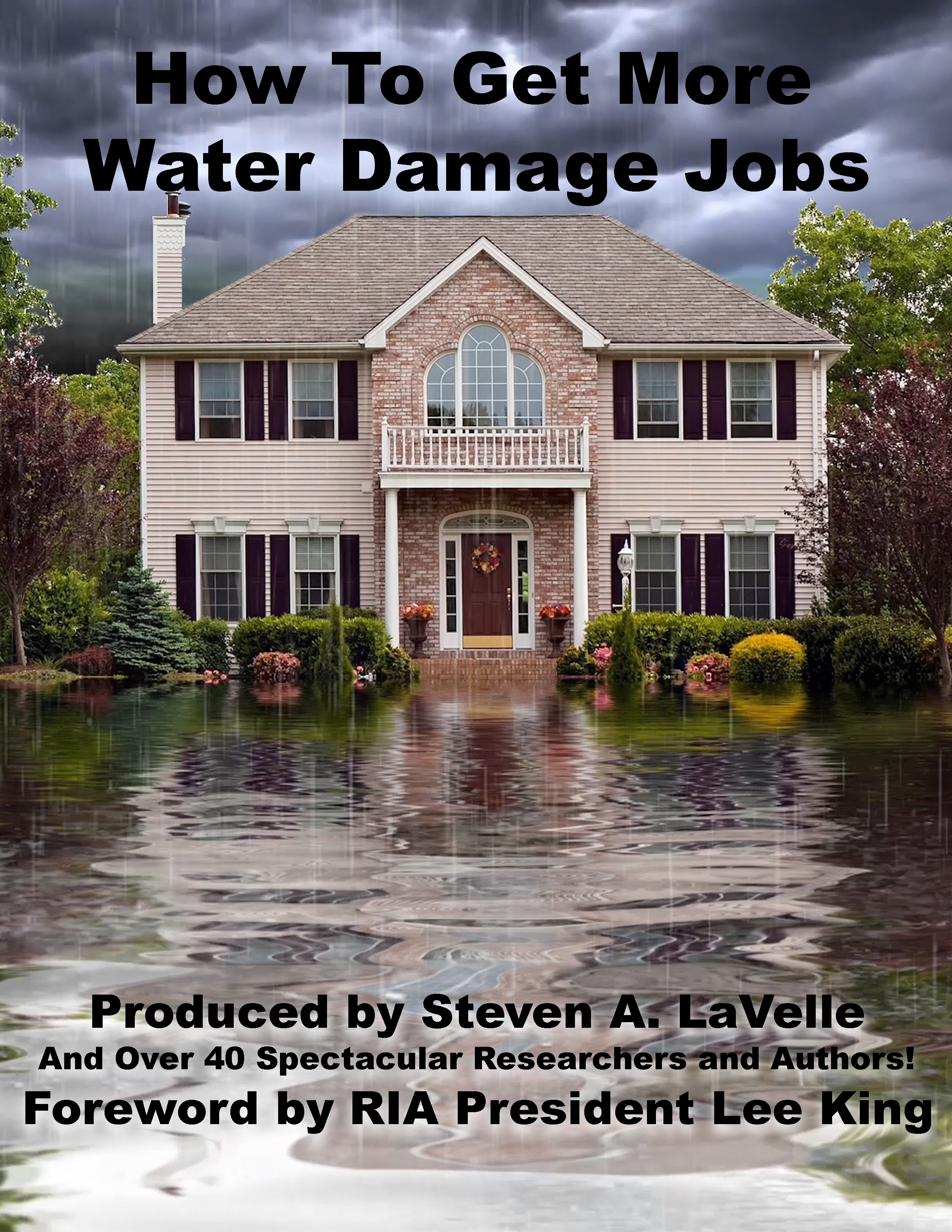Restoring Success: Finding Common Ground Between Restorers & Inspectors
The role of an inspector & when to call for help

In the restoration world, it's hard to know sometimes when to look to an expert for a little outside help on a job. However, learning when to ask for help can make all the difference between you being the hero, and you being the defendant in court. This Restoring Success column is a team effort by a seasoned restorer and seasoned inspector on the benefits of learning to work together.
Here's Lisa: Although I have been aware and understand to some extent the role of a flooring inspector, this past year I have had the opportunity to make many more flooring inspector friends and have found that we (restorers and inspectors) have quite a bit in common.
As someone who represents the Restoration side of the world, I was questioned by some of my new Inspector Friends as to why we, Restorers, don’t utilize the expertise that the Inspectors have more often. Well, in all my years of discussions, brainstorming, etc. with restorers, insurance professionals, and carpet cleaners from all over the country; I never had a conversation about Inspectors.
Ironically, one of our most recognized certifying bodies is the IICRC (Institute of Inspection, Cleaning, and Restoration Certification), and yet the inspectors are sometimes thought of in a world of their own.
Let’s go back to the question that I was asked. Why don’t we, restorers, utilize these experts? I answered by explaining that most of us are restoring to pre-loss condition and working within confines of database pricing, insurance policies, and other restrictions. In the purest sense, as a restorer, I can’t hire an expert and expect to be paid for their work by the customer or insurance company, unless it can be justified. Regardless of whether or not a restorer operates within this type of system or follows some other model, we all have to answer to someone and justify our charges.
Put aside the word "inspector" in your mind, and start thinking of them as experts. All the inspectors I have met are true experts in their field. They have expertise in flooring installations in general, but also as it relates to drying, moisture levels, and indoor environments. Yes, I said the word all restorers love: drying. They also utilize a variety of meters and tools.
Now, we are getting somewhere and we have something in common. Actually, there's more…
I believe there is opportunity for inspectors and restorers to learn from each other, become friends, and collaborate. I present an interview with inspector and expert Claudia Lezell, and encourage you to make some inspector friends.
Here's Claudia: I moved to Texas in 1981 with a degree in Deaf Education from Michigan State University and taught the deaf and hearing impaired for three years, until meeting my first husband, a floor cover installation technician, and opening our first retail store in 1983. By day, we sold all types of floor coverings and I taught; by night, we installed flooring. Our business grew so fast, we opened our first retail floor covering and design store in 1983, followed by the second retail location in the early 90's.
We had very successful installations, until the early 90's, when many of the products including floor covering, adhesives, components started to have to change because of EPA rule changes and even with waste disposal. As a result, what had worked for years started to not perform to the degree as anticipated. I knew as far as quality control, nothing in our operation had drastically changed, which pointed to the changes in materials etc. In my opinion, one floor covering failure, no matter fault, is one too many.
In addition, living in the Gulf Coast of Texas, I also started noticing the floor covering adhered to slab on grade (ground) started to become temperamental. After numerous changes in the various inter-related industries with company buy-outs, export and importing of trade, I found the floors I trusted to perform, at times, no longer did!
At the same time, many fingers started being pointed towards the various issues with floor covering we now were facing, in the wrong direction. As an end result, either money was thrown by those not at fault, just hoping the issue would go away. Since the last one in is usually the last one to hold the bag, I made a determination to go back and study why these issues were happening, and as a result completely got out of the selling of floor covering material and interior design in 1994.
Ironically, while tubing down the Guadalupe River on vacation with some floor covering and design colleagues and my second husband of 25 years and father of our beautiful 19 year old daughter, I met a fellow interior designer and floor covering contractor. Interestingly enough, after chatting for just few minutes, we both realized we had so much in common and sadly the majority was how the various inter-related and floor covering markets had changed.
She then commented that she was a practicing IICRC Senior Carpet Inspector. I learned for the first time after years of being in the floor covering trade, that there was actually an organization devoted to the restoration, cleaning and inspection and inspection inter-related industries.
From that moment forward, my life was never the same. By coincidence, she happened to have a pen from an IICRC approved school, The Academy of Textile and Flooring, owned at that time by Carl and Bobby Williams. After attending their IICRC Senior Carpet Inspector certification and hard surface inter-related industry certifications and training, my perspective completely changed. I realized at that time, how little I knew and how much incorrect rhetoric and reasoning I had received.
One thing that stuck out the most was the misunderstanding of concrete drying, moisture testing and floor covering replacement. As a result, and after much work by many others, I brought forward through an IICRC Task Group in the early 90's introducing the Hard Surface Division. That sector encompasses maintenance and inspection of all hard surfaces. A prerequisite course was put together through committee for the inspection certifications, the Introduction to Substrate and Subfloor Inspections. The intent was to introduce the various substrates and subfloors the inspector (or any one for that matter) might confront, from the ground level to the adhesive line, adhering the floor covering.
This ISSI course has been out for years and sadly, instead of attendance, the only thing that has increased are my claims against the various inter-related industries associated with the cleaning, restoration and inspection industries, in upwards of millions of dollars. Which leads me to the answer to the following questions:
How do you define the role of the inspector?
An inspector can be your best asset, when allowed to interpret and be part of the team to determine failure(s); but is not your ticket out, if you are part of the failure and not the solutions.
What do you think the relationship between inspectors and restorers look like?
As a floor covering inspector and subject matter expert to the inter-related industries, there are very few restorers I am willing to refer, mainly due to lack of updated training and education in the inter-related industries. Unfortunately, some of my largest clientele had to learn very expensive lessons, when just presence in the classroom, would have cost much less...and even with lunch! Those who have learned this way, I am happy to say, do now send their technicians, staff, etc. through the inspection certification and related inter-related programs, but with environmental and technological changes, that's not always enough.
I have been promised so many times attendance in our classes, which many still have not fulfilled. Instead some have had to face me or someone like me, as a forensic expert witness, paying their attorneys instead of focusing on working together to solve problems, not create more!
Remember: if you are resting on your laurels of trade experience for at least 30 years, without education, remember 30-year material is no longer produced and many technological changes have occurred through the years.
WHEN should a restorer call an inspector?
BEFORE the problem! If you, the restorer, are scratching your head and doing something by guessing, call an inspector! Also, you can be a hero and walk away when they just don't know and ask for assistance or expertise.
On education in the industry…
I leave you with my one and most important thought. Remember, it is no one's industry, but all of ours to shepherd, share and improve, in order to leave behind a legacy for the next generation!
Looking for a reprint of this article?
From high-res PDFs to custom plaques, order your copy today!







